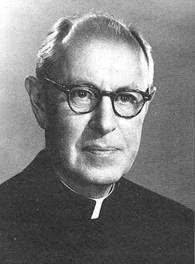John Courtney Murray (1904–1967), a Jesuit priest, theologian, and advocate of interfaith cooperation, was a lifelong supporter of the principles of the American Constitution and Bill of Rights, which he believed the Roman Catholic Church should support. He was an important influence on the development of the Second Vatican Council’s Declaration on Religious Freedom (1965), which asserted that all individuals have a right to religious freedom, even if a government recognizes a particular religious community. This position contrasted with the church’s earlier view that if the church were ever to achieve a majority in the United States, it would be obligated to establish Catholicism as the state religion.
Murray helped draft an interfaith declaration
Born in New York City, Murray earned degrees from Weston College and Boston College. He was ordained a priest in 1933 and earned a doctorate in theology at the Gregorian University in Rome in 1937. In 1943 he helped draft the Declaration on World Peace, an interfaith declaration that emphasized the importance of respecting human dignity and creating international institutions and collaboration. He spent most of his life teaching at Woodstock College, a Jesuit seminary near Baltimore, Maryland. He also edited Theological Studies and America.
Murray believed founding documents were based on natural law principles
Murray believed that the Declaration of Independence had recognized the sovereignty of God and the dignity of man and that it and the Constitution and Bill of Rights, which followed, were based on natural law principles. In his most influential book, We Hold These Truths: Catholic Reflections on the American Proposition (1964), he cited freedom of speech, assembly, association, petition, and other rights as “great historical as well as civil and natural rights” (p. 49). Moreover, he thought the religion clauses in the First Amendment were more accommodating to religious beliefs than formulations that had been generated by the French Revolution and that had later prevailed in much of Europe.
Murray argued the First Amendment could secure peace in a religiously pluralistic society
Murray argued that the First Amendment recognized that freedom of religion could secure peace in a religiously pluralistic society and that the state was distinct from society. Accordingly, the first two articles of the First Amendment are articles of peace, not articles of faith (p. 65). He observed that the “most striking aspect of the American experience consists in the fact that religion itself, and not least the Catholic Church, has benefited by our free institutions, by the maintenance…of the distinction between church and state.”
Although he thought this doctrine had sometimes been incorrectly interpreted — for example, in the withholding of state funds from parochial schools — he believed the idea of separating church and state was a genuine advance in human understanding that the Catholic Church should positively endorse. For a time, however, the church asked Murray to cease publishing on the subject.
In a chapter on censorship in We Hold These Truths, Murray distinguished between public and private morality. He argued that any censorship should have community support, that it should be administered through strict judicial processes, and that any laws on the subject should be clearly and narrowly drawn. Churches and private organizations had the right to draw stricter standards for their members than the law required.
John Vile is a professor of political science and dean of the Honors College at Middle Tennessee State University. He is co-editor of the Encyclopedia of the First Amendment. This article was originally published in 2009.

